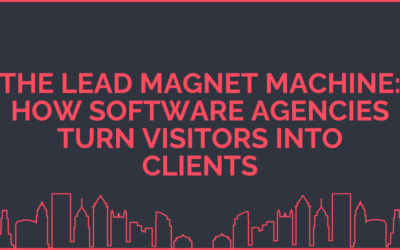Lead generation is one of the biggest challenges software development agencies face. With long sales cycles, high competition, and a need for deep technical understanding, attracting and converting the right leads can feel like an uphill battle.
Traditional methods like cold outreach, paid ads, and networking often fall short because they fail to establish trust or demonstrate expertise upfront. That’s where an educational email course changes the game. By offering valuable, structured content over time, software agencies can warm up leads, position themselves as experts, and convert prospects more effectively.
In this article, you will learn:
- Why educational email courses work better than traditional lead generation strategies.
- How an email course shortens the sales cycle by pre-educating prospects.
- How it builds trust and positions your agency as an authority.
Let’s explore why lead generation is so challenging for software agencies—and why email courses offer a better solution.
1. Why Software Development Agencies Struggle with Lead Generation
Software development agencies operate in a highly competitive space, where winning new clients requires more than just a great portfolio. Unlike product-based businesses, where customers can make quick purchasing decisions, software services involve complex, high-ticket projects with longer sales cycles. This makes lead generation especially challenging.
The Long and Complex Sales Cycle
Most software development projects involve a high level of customization and require deep technical knowledge to understand the best solutions. Prospective clients often need to:
- Identify their problem (which they might not fully understand yet).
- Explore possible solutions (comparing different technologies, agencies, or approaches).
- Evaluate vendors (reviewing case studies, past work, and expertise).
- Seek internal approval (especially in mid-to-large businesses with multiple decision-makers).
This process takes time. Leads who aren’t fully educated about their needs or the available solutions often drop off before even booking a call.
Why Traditional Lead Generation Tactics Fall Short
Many software agencies rely on outbound tactics like cold outreach, PPC ads, and networking events to generate leads. While these methods can bring in inquiries, they often don’t convert well because:
- Cold outreach feels intrusive – Prospects aren’t ready to engage.
- Ads attract unqualified leads – Many aren’t serious buyers yet.
- Networking takes time – Face-to-face trust-building isn’t scalable.
The Need for a Trust-Based Approach
Since software development is a high-investment decision, prospects need to trust an agency before committing. The most effective way to build that trust is by providing value first—educating leads before they ever enter a sales conversation.
This is where an educational email course becomes the perfect lead generation tool. Instead of pushing for a sale upfront, it nurtures leads over time, positioning your agency as the obvious choice when they’re ready to buy.
2. How an Email Course Shortens the Sales Cycle by Pre-Educating Prospects
For software development agencies, the sales cycle is often long and complex. Prospective clients need time to understand their needs, explore solutions, and evaluate vendors before making a decision. An educational email course accelerates this process by helping leads self-educate before ever speaking with a salesperson—leading to faster, more informed sales conversations.
Most Sales Conversations Start Too Early
In traditional lead generation, agencies often try to book sales calls before the prospect is ready. This leads to:
- Unqualified leads who don’t fully understand their problem.
- Time wasted on discovery calls that go nowhere.
- Resistance and skepticism because the prospect doesn’t yet trust the agency.
Instead of jumping straight into a sales conversation, an email course educates leads in advance, ensuring that when they do reach out, they are already informed and engaged.
An Email Course Helps Prospects Self-Qualify
Not every lead is a good fit for your agency. The best way to filter out unqualified prospects without spending hours on sales calls is by letting them self-qualify through education.
With an email course, leads:
- Learn about the challenges and solutions before talking to you.
- Determine if your agency’s approach aligns with their needs.
- Move through the sales funnel faster because they already understand key concepts.
For example, if your agency specializes in custom event management apps, your email course might include:
- Email 1: The biggest challenges event planners face in managing guest lists and schedules.
- Email 2: Must-have features in an event management app: What actually saves time?
- Email 3: DIY tools vs. custom development: When should you build from scratch?
- Email 4: Case study: How our agency helped an event planning company streamline operations.
By the time a prospect reaches out, they already understand your expertise and approach, making the sales conversation more productive and faster.
Pre-Educated Leads Have Fewer Objections
One of the biggest barriers in software sales is overcoming objections related to:
- Pricing (“Why is custom development so expensive?”)
- Timeframe (“How long does a project like this really take?”)
- Technology choices (“Should we go with a no-code solution instead?”)
An email course addresses these concerns before they come up by educating prospects on:
- The real cost factors behind software development.
- How project timelines are structured.
- Why custom solutions can outperform off-the-shelf software in the long run.
When leads already understand these factors, sales calls become easier, shorter, and more conversion-focused—rather than a long back-and-forth full of objections.
Bottom Line: A Shorter, Smoother Sales Process
By educating leads before they enter the sales funnel, an email course ensures that:
- Sales calls happen with informed, engaged prospects.
- Less time is spent answering basic questions.
- More leads move from inquiry to contract faster.
3. How an Email Course Builds Trust and Positions Your Agency as an Authority
In a competitive industry like software development, trust is the deciding factor when clients choose an agency. Since most businesses don’t have the technical expertise to evaluate software solutions on their own, they rely on expert opinions and proven results to make informed decisions. An educational email course helps establish your agency as the go-to expert, making it easier to close deals when prospects are ready.
Education Builds Credibility, Not Just Brand Awareness
Many software agencies rely on blogs, case studies, and portfolio pages to demonstrate expertise. While these can be effective, they often require prospects to actively seek out the information. An email course delivers valuable insights directly to their inbox, keeping your agency top of mind while building credibility over time.
By consistently providing useful content, you show potential clients that:
- You understand their pain points.
- You have a deep knowledge of industry best practices.
- You’re not just selling a service—you’re offering solutions.
For example, an agency specializing in fitness apps might create an email course that includes:
- Email 1: “Why Most Fitness Apps Fail: 3 Mistakes to Avoid”
- Email 2: “The Science of User Engagement: How to Keep Users Coming Back”
- Email 3: “Monetizing a Fitness App: Subscription Models vs. One-Time Purchases”
- Email 4: “How We Helped a Fitness Startup Increase App Retention by 40%”
By the time the course ends, prospects see your agency as a trusted expert, not just another software vendor.
A Trust-First Approach Converts More Leads
People are more likely to hire experts they trust rather than those who just pitch a service. An educational email course establishes trust in several ways:
- No-pressure engagement – Instead of immediately selling, you’re guiding and educating.
- Demonstrating expertise – Providing deep insights shows you know what you’re doing.
- Staying top of mind – Regular emails keep your agency in front of prospects without being pushy.
By the time leads reach out, they feel like they already know and trust you, making sales conversations easier and more productive.
Authority Leads to Word-of-Mouth and Referrals
Even if a lead doesn’t convert right away, they may share your content with colleagues or return when they’re ready to invest in software development. When prospects consistently associate your agency with valuable insights and solutions, they’re more likely to:
- Recommend you to others in their industry.
- Return when they’re ready to move forward.
- Follow your content and engage with future offers.
Bottom Line: Positioning Over Pitching
An educational email course turns your agency into a trusted authority by focusing on value first, sales second. Instead of convincing leads to work with you, you naturally attract the right clients—those who already see you as the best option.
Wrapping Up
Lead generation for software development agencies is challenging, but an educational email course provides a scalable, trust-building, and conversion-focused approach that outperforms traditional methods. Instead of cold outreach or generic ads, an email course nurtures leads with valuable insights, helping them understand their needs and why your agency is the right fit.
Key Takeaways:
- It shortens the sales cycle by pre-educating prospects, so they enter conversations ready to engage.
- It builds trust and positions your agency as an authority, making leads more confident in working with you.
- It works on autopilot, continuously nurturing leads while you focus on delivering high-quality services.
But implementing a successful email course requires the right strategy, the right content, and the right execution—and that’s where we come in.
At Skyline Dojo, we specialize in creating high-converting educational email courses tailored specifically for software development agencies. With our experience, we’ll help you generate more leads, build authority, and close deals faster—without wasting time on unqualified prospects.


